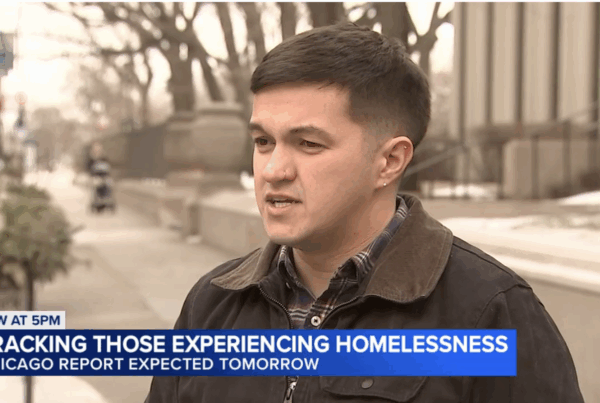
Chicago has expanded the pilot program “A Day for Change” in an effort to offer increased support to those struggling with homelessness. (Nltram242 / Flickr)
By Maya Miller
For the past three months, case workers from the nonprofit organization A Save Haven Foundation have been driving through the city offering panhandlers and homeless individuals a chance to work. The five-hour shifts consist of manual labor, such as shoveling snow or picking up trash, for a cash payment of about $55.
Last week, Mayor Rahm Emanuel announced the city would allocate $540,000 toward expanding the initiative, called A Day for Change. The yearlong program aims to help more than 550 people who are struggling with housing and economic stability.
“To ensure every Chicagoan has an opportunity for steady housing and employment, we are investing in programs that work,” Emanuel said in a press release announcing the expansion.
While the pilot program was designed to reach 100 people, the mayor’s office said it reached 225 people in its first three months for a total payout of $12,000-$15,000. That breaks down to payments of $53-$66 per individual for each five-hour shift worked.
Modeled after a similar program in Albuquerque, New Mexico, a Day for Change stipulates that participants can work up to 11 times per year, earning a maximum of $600, to avoid IRS reporting requirements.
Though the city has kept records on participants’ income, it did not release data on the overall success of the program, such as the number of individuals who ended up with full-time jobs or secured housing following their participation in the program.
In a Chicago Sun-Times column last week, journalist Mark Brown reported that of the program’s original 225 participants, 25 followed up for workforce development, two found permanent employment and three are in job training programs. According to these figures, the program has a success rate of 11.1 percent at best (provided all who are in training or development end up with jobs), and 0.88 percent at worst.
A Safe Haven’s President Neli Rowland acknowledges that the program has so far resulted in “a handful” of job opportunities. But she believes the program is effective at connecting individuals with the services they need and that it could work as a national model.
“This could potentially be a missing link for a lot of cities facing this issue,” Rowland said.
Some advocacy groups in the city wonder whether it’s too early to determine the program’s efficacy.
“It’s not really clear what kind of a lasting impact it has on people,” said Julie Dworkin, the director of policy for the Chicago Coalition for the Homeless, which is not involved with A Day for Change. “The verdict is still out.”
Dworkin also raised concerns about the amount of funding allocated toward the program. Last June, the City Council passed an ordinance that implemented a 4-percent surcharge on Airbnb and home-sharing services. The funds, which the city estimated at $1.8 million, were reserved for homeless agencies and services.
“This is the first dedicated funding stream for homelessness that the city has passed from these funds,” Dworkin said. “If we had been asked, this probably wouldn’t have been the first thing that came to mind. We’re interested in housing first.”
The Chicago Coalition for the Homeless is finalizing a proposal with the city that will decide how $900,000 of the funds is spent.
Though data collected by the city in 2016 indicates a shrinking homeless population, advocacy groups have raised concerns over the availability of affordable housing across the city and state.
Dworkin is hopeful that a Day for Change will make a greater impact than she may think.
“We’re not saying it’s a bad thing and it’s not going to help some people, but we’re wondering if it is the best use of the limited resources,” Dworkin said.






